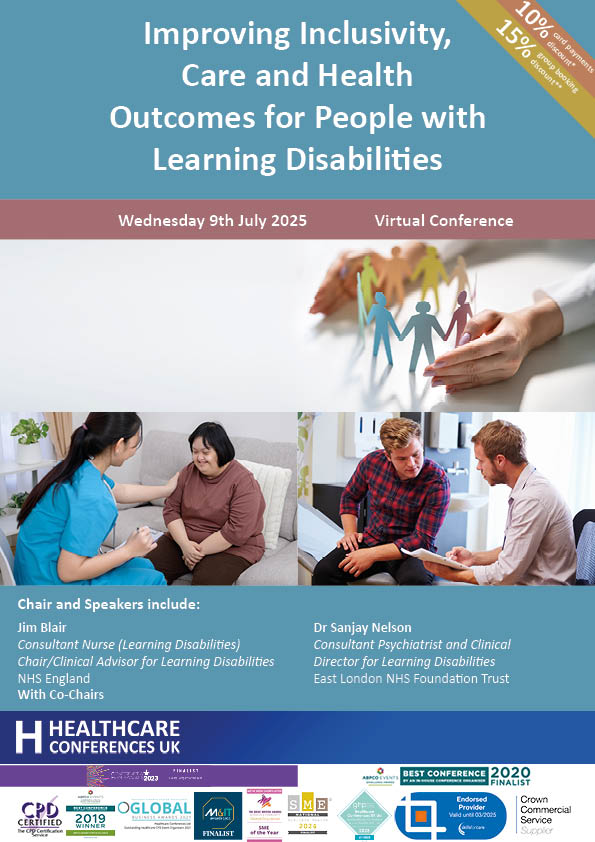Follow the conference on X #learningdisabconf
“People with learning disabilities on average are dying a lot younger than the general population, somewhere between 19 and 23 years young, from preventable causes of death. An annual health check has been identified as a way to potentially find some of those illnesses or diseases that may contribute to an early death, and try to nip them in the bud.”
Helen Thompson, Learning Disability Nurse for Cwm Taf Morgannwg Health Board, September 2024
In this conference we will hear an overview of the ‘Preventing people with a learning disability from dying too young’ Nuffield Trust report and use these key findings to discuss current improvement initiatives:
• people with a learning disability are more likely than the rest of the population to be obese, particularly in teenage years and in young adulthood
• cancer is often diagnosed at a later stage for people with a learning disability – these late diagnoses are sadly often made during emergency presentation at hospital
• despite a higher prevalence of mental health problems in people with a learning disability, access to effective mental health treatments is often poor
The programme will include a look at ensuring staff receive learning disability training appropriate to their role, and making reasonable adjustments for people with a learning disability in hospital, in line with the recommendations by The Royal Mencap Society:
“Reasonable adjustments can be simple changes made by one healthcare professional, or they can be more complex and need multiple teams to work together. Making reasonable adjustments can mean removing barriers that people with a learning disability face or providing something extra for someone with a learning disability to enable them to access the healthcare they need.”
The Royal Mencap Society, April 2024
While initiatives have been made to tackle the issue of healthcare inclusivity for people with learning disabilities and autism, support for these groups are declining in some areas.
“The number of learning disability nurses has lowered to unacceptable levels – and we are even hearing about universities closing their courses. This dearth of support for one of society’s most marginalised groups is appalling.”
Jonathan Beebee, Professional Lead for Learning Disability Nursing at Royal College of Nursing, June 2024
“We continue to find evidence of staff not having the specialist training required to care for the people, particularly autistic people and people with a learning disability. As highlighted in last year’s Monitoring the Mental Health Act report, we are concerned that this lack of training can lead to people not receiving the care they need. In addition, poor staff training and supervision, high turnover of staff and consistent staff shortages are all inherent risk factors that lead to services developing a closed culture. We define a closed culture as ‘a poor culture that can lead to harm.”
CQC Mental Health Act Review, published 14 March 2025
Through real-world case studies, lived experiences perspectives and the latest guidelines and standards, we’ll explore innovative approaches to enhancing inclusivity, care and health outcomes for people with learning disabilities and autism. Learn from leading professionals in psychiatry, clinical practice, and law, while connecting with others who are committed to improving services and creating more inclusive healthcare.
The benefits of attending are that this conference will enable you to:
Network with colleagues who are working to make healthcare more accessible to people with learning disabilities
Understand what the latest statistical data tells us about the state of healthcare accessibility
Learn from a lived experience speaker
Understand the mental health problems faced by people with learning disabilities and autism, and a personalised approach to treatment
Update your knowledge on enhancing communication and reasonable adjustments in the hospital setting
Reflect on findings from the latest reports on preventing people with a learning disability from dying too young
Identifying and reducing barriers to accessing healthcare
Learn from best practice case studies from leading healthcare professionals
Explore how The Oliver McGowan Mandatory Training on Learning Disability and Autism will provide appropriately adjusted care for people with a learning disability
Reflect on legal considerations for inclusive healthcare and reasonable adjustments
Learn how new Digital Health and Assistive Technology can be implemented in your trust
Reflect on the latest developments and challenges faced in healthcare for people with learning disabilities
Self assess and reflect on your own practice
Supports CPD professional development and acts as revalidation evidence. This course provides 5 Hrs training for CPD subject to peer group approval for revalidation purposes




